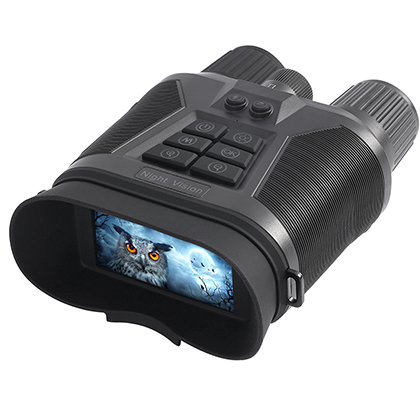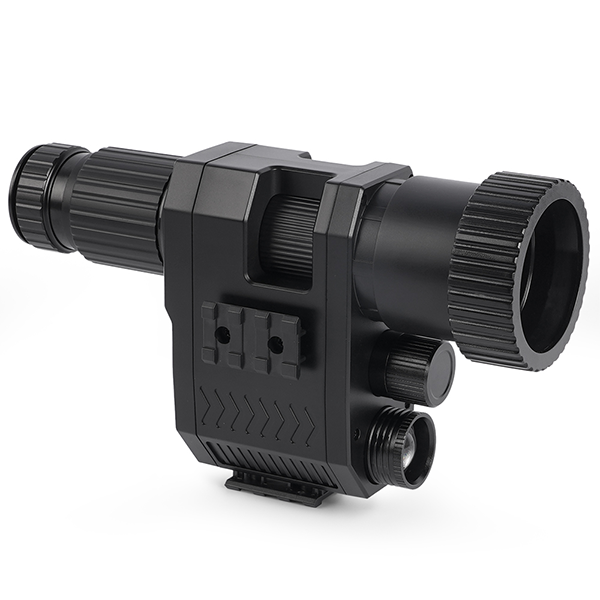Night vision devices are essential tools for outdoor enthusiasts, hunters, security professionals, and law enforcement officers. They allow users to see clearly in low-light or completely dark environments by amplifying available light. Among the different types of night vision equipment, monoculars and binoculars are the most common. Both serve the same purpose but differ in design, performance, and comfort. Understanding their differences will help you choose the right type for your needs.
To begin with, a night vision monocular is a single-eye viewing device that magnifies images in the dark. It is compact, lightweight, and easy to handle, making it suitable for users who value portability and flexibility. Most monoculars are designed with one objective lens and one eyepiece, providing users with a straightforward, one-eye viewing experience.
In practical use, monoculars are popular among hunters, hikers, and tactical professionals who need to move quickly and operate with one free hand. Since they only use one eye, users can keep their other eye open to maintain natural night vision awareness. This makes monoculars ideal for scanning areas, identifying targets, or using with other optical equipment like scopes or cameras.

On the other hand, a night vision binocular is designed for two-eye viewing. It features two objective lenses and two eyepieces, allowing both eyes to work together for a more natural and immersive visual experience. This design provides greater depth perception and comfort during long observation sessions.
Binoculars are generally heavier and bulkier than monoculars, but they offer excellent image stability and a wider field of view. They are ideal for stationary observation activities such as wildlife monitoring, surveillance, and perimeter security. With two lenses amplifying light simultaneously, night vision binoculars can deliver sharper and clearer images, especially when used over extended periods.
When comparing night vision monoculars vs binoculars, several factors determine which one is better for specific applications. The main differences include weight, comfort, field of view, image quality, and cost.
Weight and Size: Monoculars are smaller and lighter, often fitting in one hand or a pocket. Binoculars, in contrast, are bulkier due to their dual-lens design.
Comfort and Depth Perception: Binoculars allow both eyes to focus together, reducing eye fatigue during extended use. Monoculars, while more compact, can cause eye strain if used for long periods.
Field of View: Binoculars typically offer a wider field of view, allowing users to scan large areas quickly. Monoculars provide a narrower view but are more focused and easier to handle.
Image Clarity: Because binoculars collect more light, they usually produce brighter images. Monoculars still deliver clear visuals but may have slightly lower depth perception.
Cost: Monoculars are generally more affordable, making them a practical choice for casual users or those on a budget.

Selecting between a monocular and binocular depends largely on how and where you plan to use it. If you need a lightweight, compact, and versatile device for quick scanning or navigation, a night vision monocular is ideal. It’s perfect for users who move frequently or need to combine it with other equipment, such as helmets or cameras.
However, if your goal is comfortable long-term observation, such as wildlife watching, patrolling, or surveillance, a night vision binocular will serve better. The dual-lens setup ensures visual stability and less strain during extended sessions.
In both cases, it’s important to consider the generation of night vision technology, such as Gen 1, Gen 2, or digital infrared versions, as well as resolution, range, and battery life before purchasing. These factors affect performance regardless of whether you choose a monocular or binocular.
Both monoculars and binoculars have unique strengths in night vision applications. Monoculars are compact, lightweight, and practical for fast, mobile use, while binoculars provide comfort, depth, and clarity for extended viewing. The right choice depends on your usage environment, activity type, and comfort preferences.
When selecting high-quality night vision devices, it’s essential to choose a reliable supplier with expertise in optical engineering and product consistency.
Yijing Optoelectronics specializes in advanced night vision devices, laser modules, and precision optical technologies. With professional R&D and manufacturing capabilities, Yijing Optoelectronics delivers dependable night vision solutions for outdoor, tactical, and industrial applications.
Discover more about Yijing Optoelectronics’ night vision innovations and find the perfect device to enhance your visibility and performance in the dark.